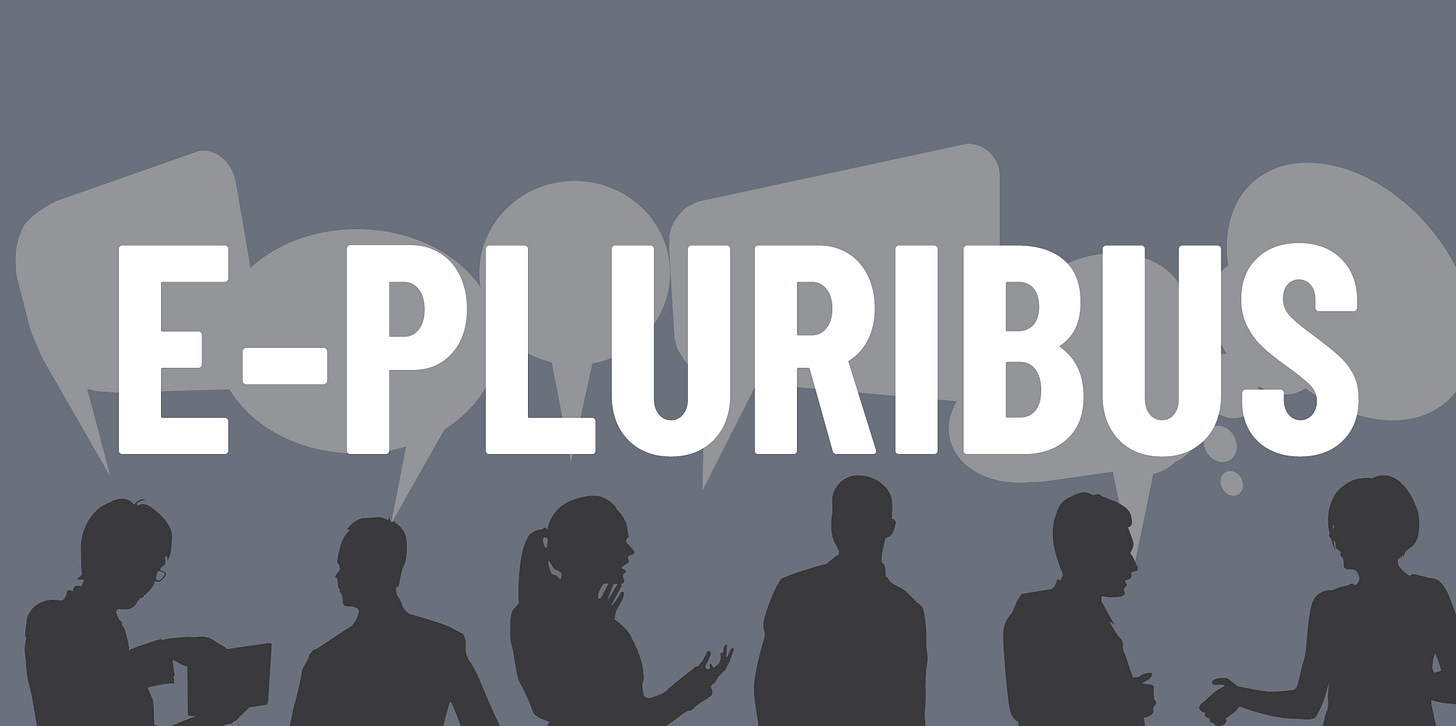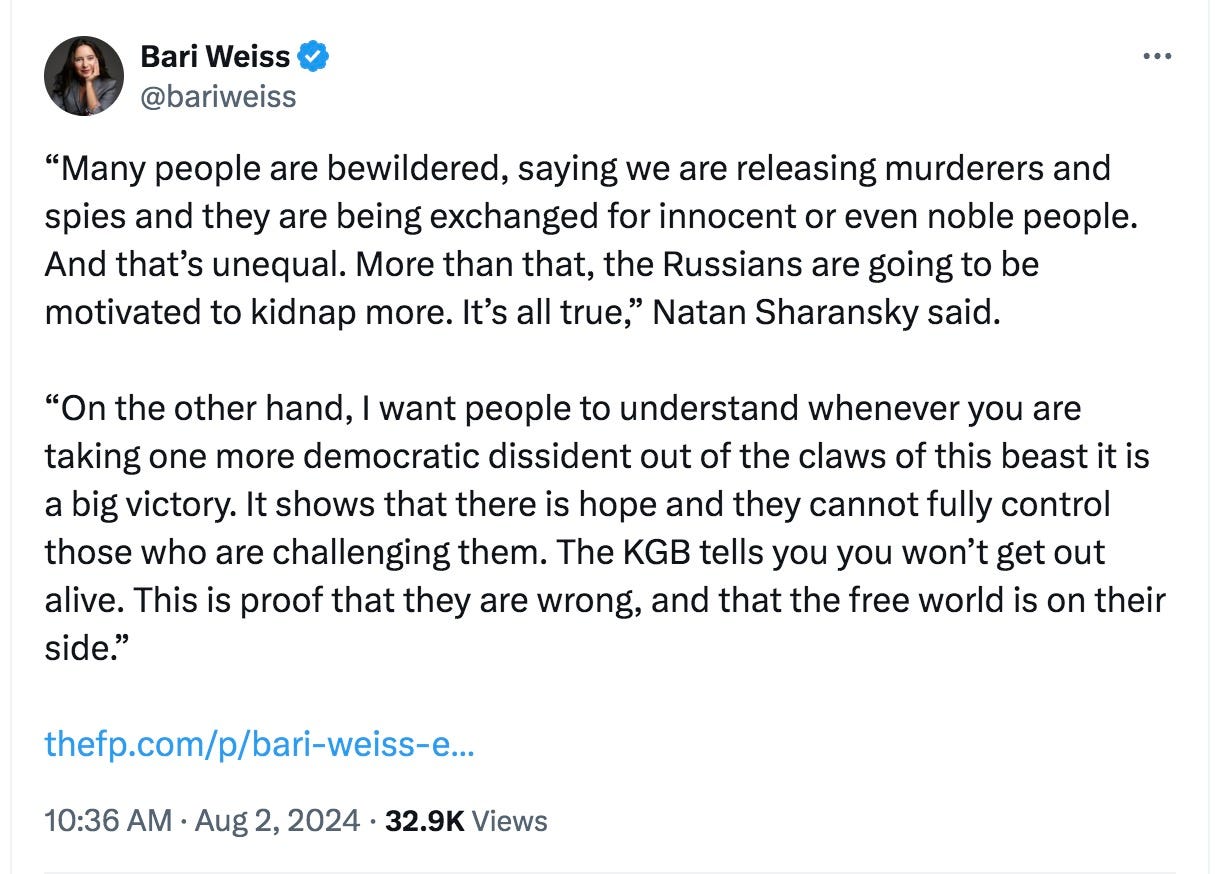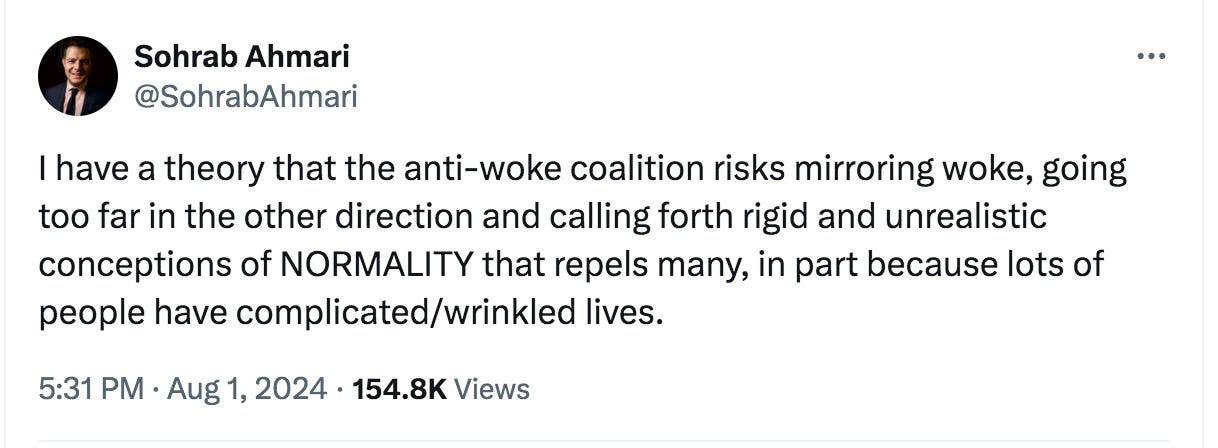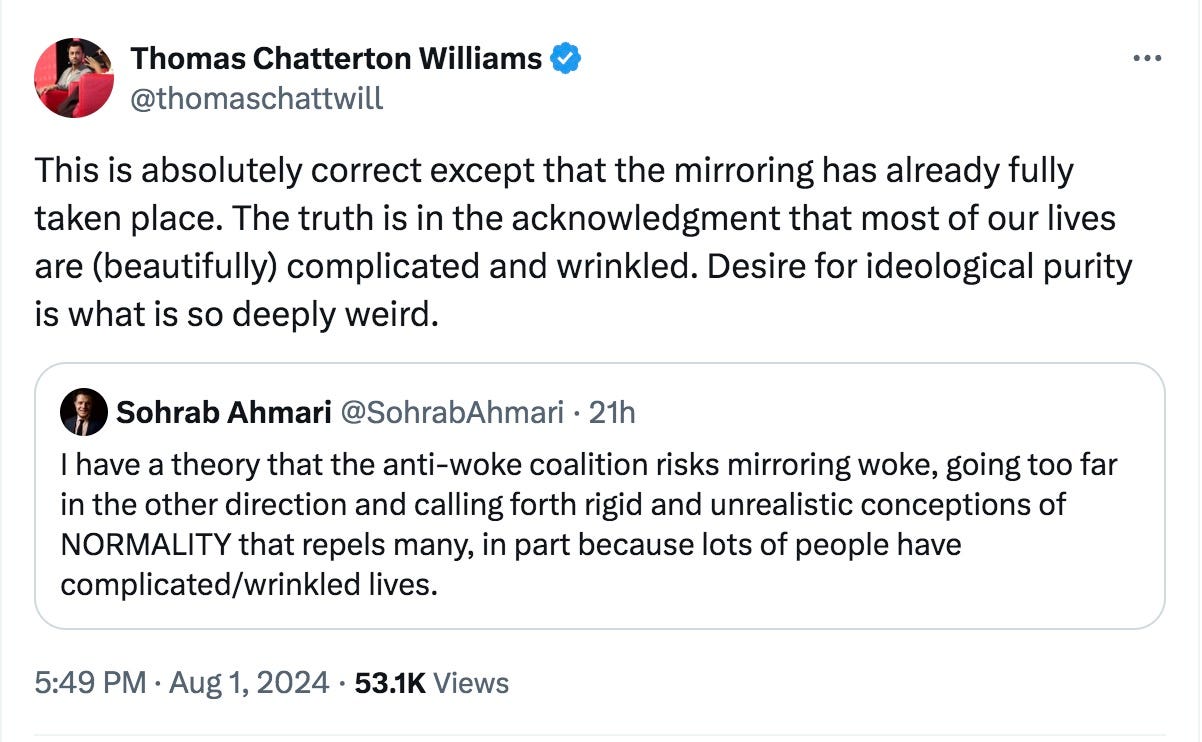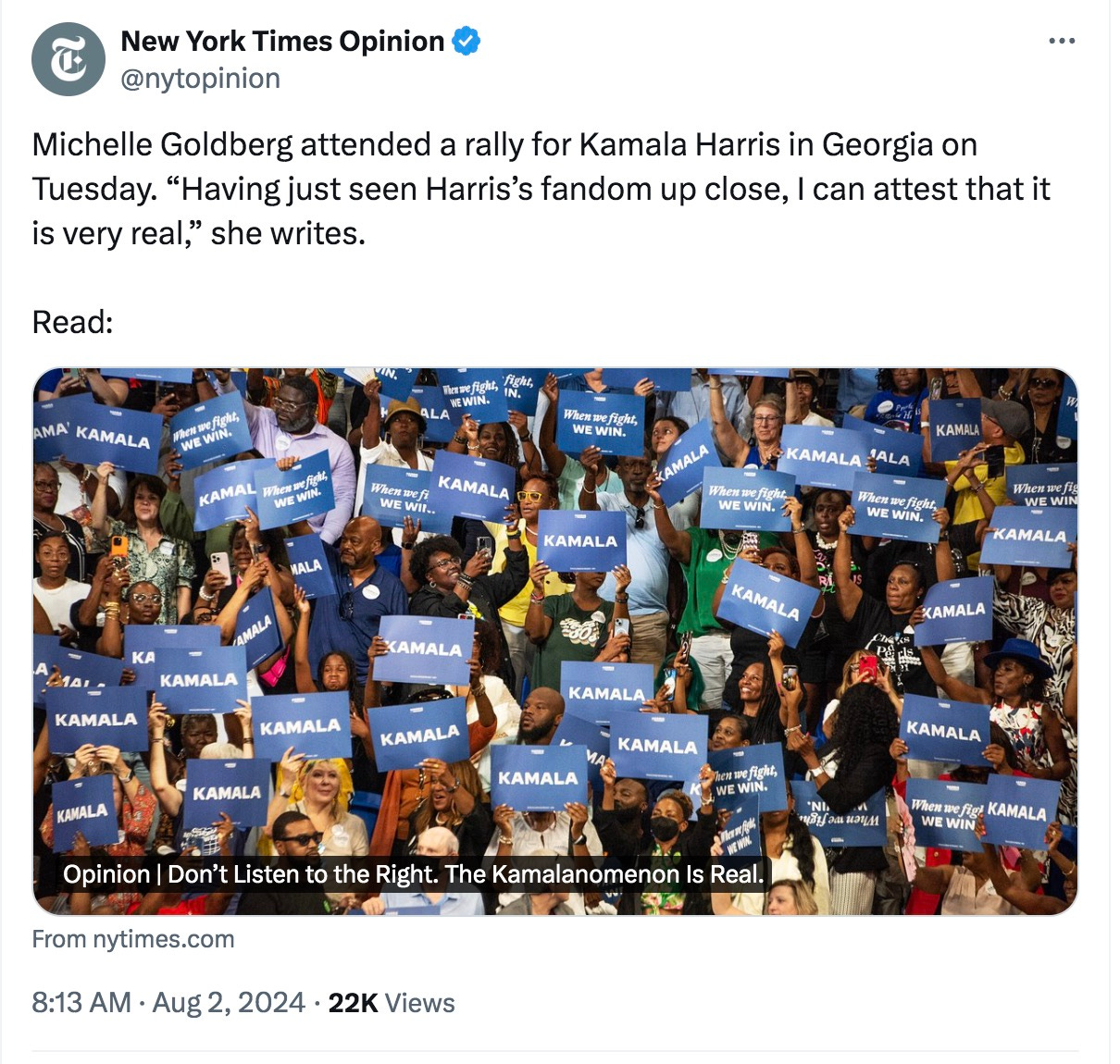E-Pluribus | August 2, 2024
If you can't say something nice, get out of politics; the power of Identity Politics: it ain't what it used to be; and Americans Against the First Amendment?
A round-up of the latest and best musings on the rise of illiberalism in the public discourse:
Christopher T. Sununu: My Fellow Republicans, Stop the Trash Talk
Trash talk may be popular on playground basketball courts, but New Hampshire governor Christopher Sununu says it has no place in a presidential campaign. In the New York Times, Sununu urges his party to rise above the fray.
Independent voters are independent for a reason. They are not driven to the polls by personal attacks. Candidates need to give them a reason to turn out and vote. What solutions are you going to provide that will make life better for them, their families and their communities? This election will likely be a coin toss, and whoever turns out these voters will be well positioned to win.
Now, instead of giving independents a reason to show up and vote for the solutions the Republican Party can offer, our candidates are responding to comments by Democrats like Gov. Tim Walz of Minnesota that the G.O.P. is led by “weird people.” Don’t get me wrong: Such comments from Democrats do nothing to move the conversation forward, either. The message from both sides must be inspirational and focused and about the results that can be delivered for the American people.
Politicians usually don’t lose votes for laughing or smiling too much. Attacks like those waged against Ms. Harris are unserious and don’t meet the moment that American families find themselves in. You have to connect with voters on their issues and their concerns. You earn their trust by appreciating that the job is bigger than yourself. You win tough elections by showing real empathy and addressing the anxieties that keep them up at night.
[. . .]
The promise of economic relief has a real, tangible impact on families. And through the early summer, the Trump team was offering a disciplined, professional campaign focused on spelling out why American families felt as if they had a bit more cash in their wallets before the Biden presidency.
That was working for Mr. Trump and Republicans. But, at least for the moment, we seem to have lost our focus.
When independent voters in battleground states — those who will determine the outcome of this election — turn on the TV they see too many members of my party lobbing personal attacks at Ms. Harris. It’s the worst kind of politics. It lowers the conversation and it plays into the Democrats’ narrative that this election is about political revenge for Mr. Trump. And more important, it reaps no reward.
[. . .]
Now more than ever, Americans — independents, especially — are ready to turn down the heat on political rhetoric. The topic of “childless cat ladies” has yet to register as a winning issue for Republicans in the polls. Until that happens (spoiler: it won’t), let’s focus on what matters: making life easier for families.
Read the whole thing.
Thomas Chatterton Williams: Identity Politics Loses Its Power
Of course black lives matter. But does Black Lives Matter, matter? Not as much as it used to, writes Thomas Chatterton Williams for The Atlantic. Williams argues that voters are tired of identity politics, and that both parties will simply alienate voters if they continue to behave as though nothing has changed.
Black lives matter’s persuasive power and influence climaxed in 2020, in the reckoning that followed the murder of George Floyd. It was a time of rare consensus, when some two-thirds of Americans expressed support for the cause, according to the Pew Research Center. But by last year, only half of Americans continued to support BLM, and less than a quarter did so strongly. “A majority of Americans say the increased focus on issues of race and racial inequality in the past three years hasn’t led to changes that have improved the lives of Black people,” Pew found.
Now BLM is weighing in on the candidacy of Vice President Kamala Harris. One might assume, based on the group’s foundational emphasis on identity politics, that its support for a liberal Black woman would be full-throated. Instead, I was surprised to see it release a statement last week that was strikingly critical of the Democratic Party’s decision to elevate Harris without a primary.
“Democratic Party elites and billionaire donors are attempting to manipulate Black voters by anointing Kamala Harris and an unknown vice president as the new Democratic ticket without a primary vote by the public,” the statement reads. “While the potential outcome of a Harris presidency may be historic, the process to achieve it must align with true democratic values. We have no idea where Kamala Harris stands on the issues.” The group called for a “virtual snap primary” that would give voters a chance to voice their preferences and concerns. Bernie Sanders famously argued that “it is not good enough for somebody to say, I’m a woman; vote for me.” Now Black Lives Matter seems to be arguing that it is no longer good enough to say: I am a Black woman; vote for me.
Refreshingly, Harris herself has not relied on this argument, focusing instead on uniting liberals and their allies to defeat Donald Trump. At her first rally after President Joe Biden left the race, Harris vowed to protect reproductive rights, strengthen the middle class, and fight for a future “where no child has to grow up in poverty.” Still, her candidacy immediately inspired waves of identitarianism among various Democratic constituencies. Hundreds of thousands of Democratic voters segregated themselves by race and gender to attend fundraising calls on Zoom, as if preemptively highlighting superficial differences could somehow help them come together at a later date. Such tactics don’t reflect the fact that many voters are rejecting identity politics, which have only exacerbated the divisions they purported to heal. Coming at a time when Trump has been entrenching counterintuitive gains among Black voters and other minority groups, Democrats’ emphasis on race and identity risks undermining Harris instead of helping her.
Read it all.
Laurel Duggan: Majority of Americans think First Amendment goes too far
Should the founders have just started with the Second Amendment? Perhaps that’s an exaggeration, but a majority of Americans apparently believe 1A does go too far if a recent poll is to be believed. Via Laurel Duggan at UnHerd.
More than half of Americans believe the First Amendment goes “too far” in guaranteeing free speech, according to new polling from the Foundation for Individual Rights and Expression.
In total, 53% of Americans, including 61% of Democrats and 52% of Republicans, believe the First Amendment goes too far. About 40% at least somewhat trust the Government to determine which speech is problematic, joined by about 25% who trust the Government “a little” on this front.
Under the First Amendment, the US has more robust free speech rights than other Western nations, with Americans free to make offensive and inflammatory comments that would be banned in much of Europe without Government penalty. Germany’s ban on Holocaust denial, and the UK’s criminal penalties for obscene and offensive social media posts, would both be unconstitutional in the US. These rights, however, are not universally celebrated by Americans.
[. . .]
“Evidently, one out of every two Americans wishes they had fewer civil liberties,” Fire Chief Research Advisor Sean Stevens said in a press release. “Many of them reject the right to assemble, to have a free press, and to petition the government. This is a dictator’s fantasy.”
Read it all here.
Around Twitter (X)
Via Bari Weiss, here’s some perspective from gulag survivor Natan Sharansky on the deal with Russia that freed Evan Gershkovich and others:
Here’s a short collection of thoughts on the risk of anti-woke overreach:
And finally, “The Kamalanomenon Is Real,” says Michelle Goldberg of the New York Times. One can only assume Kamalamonium and Kamalamentum just didn’t poll as well.



